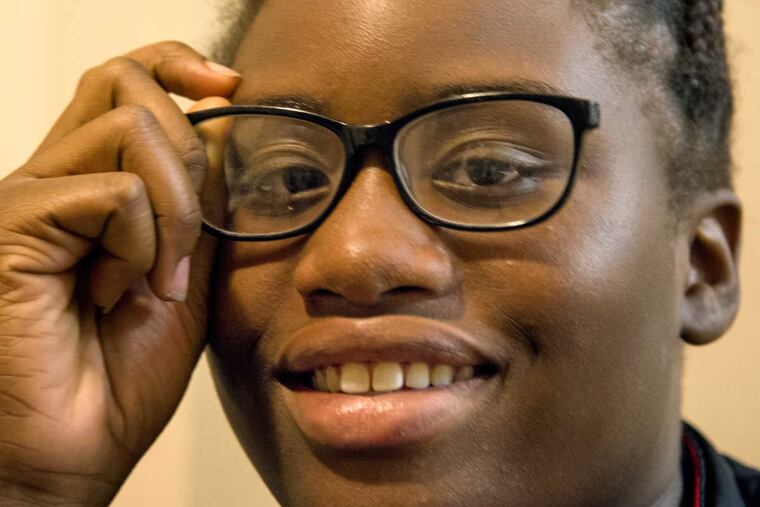For these Philly kids, eyeglasses can be life-changing
Imagine feeling disoriented walking home because you can't read street signs, or struggling in class because the whiteboard is too blurry to read.

Imagine feeling disoriented walking home because you can't read street signs, or struggling in class because the whiteboard is too blurry to read.
This was La'Shawna Johns' daily existence after she fell down while running a few weeks ago. Her eyeglasses hit the ground, and she accidentally stepped on them when she got up.
The 14-year-old tried to muddle through by squinting but succeeded only in giving herself headaches. Her mother, Rasheedah Moore, knew her daughter needed help, but couldn't afford new glasses until June, when La'Shawna's insurance would pay for a new pair.
Then Moore heard of an alternative.
On a recent Saturday, mother and daughter rose before dawn to take the bus from their North Philadelphia home to Wills Eye Hospital in Center City. It was the seventh annual Give Kids Sight Day, where uninsured and underinsured kids such as La'Shawna could get free vision screening, exams, and glasses.
Yasir Ahmed, the Wills Eye fellow who examined La'Shawna, was amazed at how well the girl was managing, considering that she's so nearsighted that she couldn't even see the big E on the eye chart.
Thanks to the program, she'll get her new glasses in a couple of weeks, rather than waiting until summer.
She's far from the only Philadelphia child in desperate need of vision correction, said Alex V. Levin, chief of pediatric ophthalmology and ocular genetics at Wills Eye, which collaborates with Public Citizens for Children and Youth, Thomas Jefferson University Hospital, Eagles Charitable Foundation, and Essilor Vision Foundation on the program.
More than 1,000 children were screened on Give Kids Sight Day. Nearly 500 were fitted for glasses, and serious vision issues such as cataracts were detected in almost 100 children. Further evaluation and treatment were scheduled for patients who needed it.
Peter Laibson, director emeritus of the Cornea Service at Wills Eye, reported that the first two out of three children examined that morning couldn't see the big E on the chart. In many cases, he said, the children have had poor vision from birth, so they think it's perfectly normal not to be able to see well.
And because they don't know enough to complain about their vision, their parents might not realize there is a problem for quite some time. A child might take the blame for poor school performance, when the real issue is an inability to see the words.
"A pair of glasses can really make a big difference in a child's life," Levin said. "When kids can see, their lives change."
Then there are the children whose vision problems will become irreversible if they aren't detected and treated in time.
Michelle Wilson Latting, a resident physician at Wills Eye, said that, often, children don't get the care they need because their parents have trouble navigating the health-care system.
One child she examined on Give Kids Sight Day had glaucoma, a condition usually associated with aging, but that can occur at any time. Increased pressure in the eye can damage the optic nerve, and the boy's mother knew he needed treatment quickly. But every medical office she called that accepted her insurance was booked for months.
"The glaucoma was advancing and if not treated, he would have gone blind," Latting said.
The effort to reach more children with serious eye conditions goes on all year. Wills Eye has partnered with the School District of Philadelphia to send outreach teams directly to the schools. Since January 2014, the Wills Eye Vision Screening Program for Children, funded by the Deerbrook Charitable Trust, has seen more than 20,000 children at district schools, as well as Boys & Girls Clubs.
"The School District just doesn't have the resources to provide eyeglasses or vision care. That is why this partnership is such a huge accomplishment," said Karyn Lynch, director of support services for the district.
Lynch explained that educating parents is also crucial. Amblyopia, also referred to as lazy eye, can be mistaken by parents as a purely cosmetic problem, but if not treated, can lead to permanent vision damage.
"Children are now getting diagnosed and treated at an early age, regardless of a family's inability to afford the service," she said.